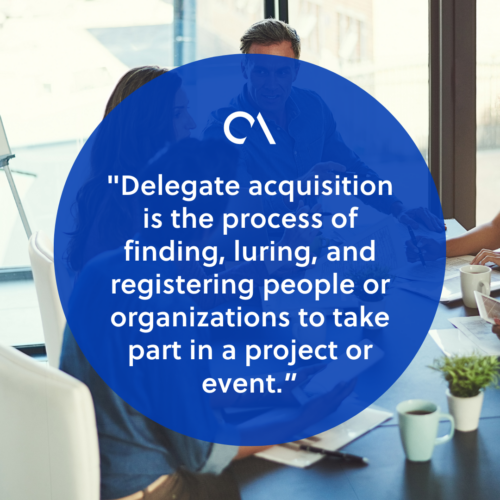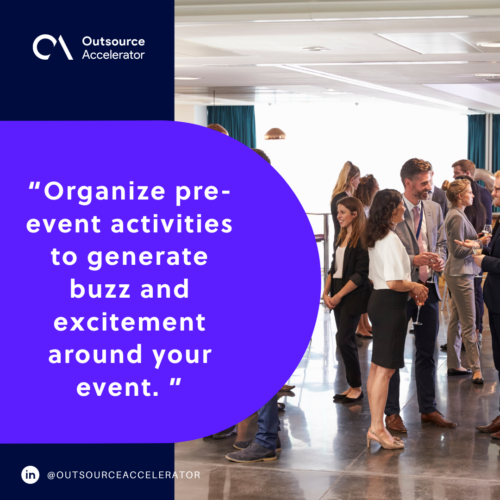10 tips for successful delegate acquisition

Are you looking to increase participation in your event or program? Effective delegation acquisition strategies are key to attracting and engaging the right people.
Whether orchestrating a conference, seminar, or trade show, the ability to attract a diverse audience of delegates is crucial to the event’s success.
In this article, we’ll explore vital tips and strategies that can help you acquire delegates more effectively.
What is delegate acquisition?
Delegate acquisition is the process of finding, luring, and registering people or organizations to take part in a project or event. This requires a series of strategic efforts aimed at encouraging those to commit to attending.
Delegate acquisition encompasses various activities, including:
- Marketing and promotion
- Networking
- Personalized communication
- Incentive offerings
Effective delegation acquisition strategies result in an event with a diverse and engaged audience, thereby enhancing its success and impact.

How does delegate acquisition work?
Delegate acquisition involves several steps that organizations can follow to attract and engage potential delegates:
Define goals and objectives
Start by clearly defining the goals and objectives of your event or program. What outcomes do you want to achieve?
This will help you determine the type of delegates you want to target.
Identify target audience
Determine the specific characteristics and demographics of your target audience. Understand factors like:
- Industry
- Job title
- Interests
- Geographical location
This will help you craft more targeted and effective delegate acquisition strategies.
Craft compelling messaging
Content that highlights the value and benefits of attending the event is essential for delegate acquisition. Develop compelling messages that communicate this fact.
Highlight what makes your event unique and how it addresses the needs and interests of your target audience. Tailor your messaging to resonate with different audience segments as well.

Utilize appropriate channels
Deploy a mix of marketing channels to reach out to potential delegates. Channel selection should take into account the tastes and habits of your audience.
These can include:
- Social media platforms
- Email marketing campaigns
- Online advertising
- Content marketing
- Traditional marketing methods (e.g., print ads, flyers, direct mail)
Generate and nurture leads
Capture and collect leads through various means, such as online registration forms, landing pages, and lead generation campaigns.
Once you have these leads, it’s important to nurture them. Use personalized communication to provide additional information, address queries, and build relationships.
Leverage partnerships and networks
Networking plays a crucial role in delegate acquisition. Collaborate with industry influencers, associations, or strategic partners to promote your event through their networks.
This can help expand your reach and tap into new audiences that align with your target demographic.
Track and measure results
Throughout the delegate acquisition process, it’s important to track and analyze data to evaluate its effectiveness.
Track metrics such as:
- Number of leads generated
- Website traffic
- Email open rates
- Conversion rates
- Engagement levels
- Attendee satisfaction
All gathered data will provide insights to refine your strategies and improve future campaigns.
10 tips for effective delegate acquisition
Here are some tips to help you maximize your delegate acquisition efforts:
1. Offer early bird incentives
Providing early bird discounts and special offers can incentivize early registration. This has the effect of creating a sense of exclusivity among potential delegates.
Limited-time offers encourage urgency and inspire people to take action sooner rather than later.
2. Host virtual tours or sneak peeks
Provide virtual tours or sneak peeks of the event venue, exhibitor booths, or session locations to give potential delegates a taste of what to expect. This immersive experience can pique their interest and motivate them to register to experience the event firsthand.
3. Implement referral programs
Encourage registered participants or previous attendees to refer others to your event. Incentivize them with rewards for successful referrals.
Word-of-mouth and personal recommendations can be powerful methods of attracting delegates.
4. Engage with industry influencers
Partner with thought leaders or influencers in your field who have a sizable fan base.
Arrange for them to speak at your event, write guest blog posts, or promote your program on their social media channels. Their endorsement can significantly boost your delegate acquisition efforts.
5. Utilize social proof
Leverage social proof to build trust and credibility for your delegate acquisition attempts. Share testimonials, case studies, and endorsements from those who have benefitted from your program.
These success stories can make it more likely for people to engage and register.
6. Offer flexible registration options
Provide flexible registration options, such as single-day passes, group discounts, or virtual attendance options. This accommodates different preferences and circumstances, making it easier for potential delegates to commit.
7. Optimize landing pages
Ensure that your event registration landing pages are well-designed, user-friendly, and optimized for conversion. Clear calls-to-action, persuasive copy, and intuitive navigation can help streamline the registration process and increase sign-ups.
8. Create interactive experiences
Interactive experiences can include:
- Hosting virtual workshops
- Interactive quizzes or polls related to event topics
- Live Q&A sessions with speakers
- Virtual networking opportunities
With this delegate acquisition strategy, you not only capture the interest of potential delegates but also offer them a taste of what to expect at the event.
9. Host pre-event activities
Organize pre-event activities to generate buzz and excitement around your event. Some examples are:
- Webinars
- Networking sessions
- Q&A sessions
These activities provide opportunities for potential delegates to interact with organizers, speakers, and fellow attendees, increasing their likelihood of registering.

10. Follow up post-event
Maintain communication with delegates even after the event has concluded. Solicit feedback, share post-event resources, and express appreciation for their participation to foster long-term relationships and encourage repeat attendance.
Delegate acquisition is necessary for any event, program, or initiative to succeed. Beyond merely filling seats, it fosters engagement, facilitates networking, and enhances brand visibility.
Attracting a diverse and informed audience creates valuable opportunities for knowledge sharing, collaboration, and professional growth. Therefore, investing in effective delegate acquisition is essential for an impactful experience for all involved.







 Independent
Independent




